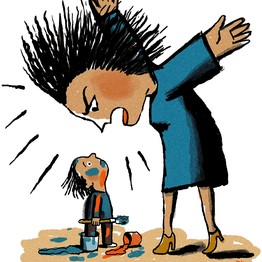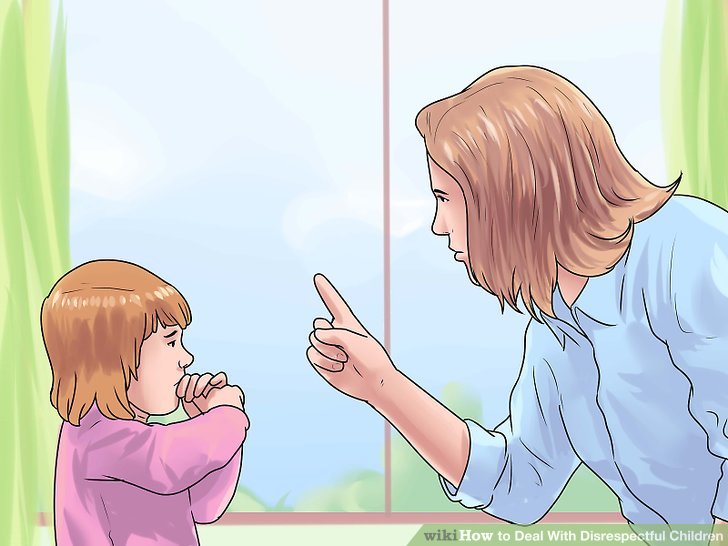Mommy Dearest: When Your Mother Has a Personality Disorder

“Paradise is at the feet of the mother.”
– Prophet Muhammad (peace be upon him)
You can divorce an abusive spouse. You can call it quits if your friend mistreats you. But what can you do if the source of your misery is your own mother?
Understandably no parent is perfect, and at least in the West, it’s a common pastime to complain about our parents. In general, there are ordinary good-enough parents who struggle with raising a “difficult child” but there are some good children who have the misfortune of having a truly toxic parent.
Within the Muslim community it’s difficult to get anyone to listen to us or validate our feelings when we talk negatively about our mothers. In general, society puts mothers on a pedestal and we are encouraged to love and respect them. In fairy tales, stepmother’s are often featured as the “wicked” parent because speaking of a biological mother as being wicked is intolerable to the majority. We are taught in Islam to be respectful of our mother’s and treat them with kindness, as taught by Prophet Muhammad (peace be upon him). We are shamed into silence by family and community members if we complain about our mother’s mistreatment of us. What should one do if our mothers are the source of abuse and toxicity in our lives?
“Yes, she’s abusive to me, but she’s my mom.”
Universally, there is the assumption that parents are predisposed to love their children unconditionally and protect them from harm. We want to believe that most parents want the best for their children. In terms of education, good parents will move school districts, participate in lotteries and pay high tuition rates in order to obtain it. Good parents want their kids to thrive and grow up to be successful, independent adults. Most parents work hard to help their children become as or more successful than they are.
It’s because of this universal belief and expectation that we find it difficult to wrap our head around the reasons why a parent might sabotage the mental, physical, and emotional well being of their children. For someone who has been fortunate to have the love and support of a good parent, the idea of a parent mistreating a child is abhorrent. We can’t imagine a parent willingly sabotaging their child’s mental, emotional, or physical development. It’s difficult to comprehend a mother purposely splitting her children against each other as either the good child or the bad child.
Sabotaging one’s own child however is a common trait of abusive individuals with a personality disorder, specifically, borderline (BPD), narcissistic (NPD), histrionic (HPD), obsessive compulsive personality (COPD), and dependent (DPD) personality disordered parents. (Important note: Obsessive Compulsive Disorder (OCD) is not the same as OCPD) People with personality disorders are also more likely than average to have other mental disorders.
The problem with personality disorders is you can’t tell a sufferer that they have it. The individual with any of the personality disorders listed above is so cemented in the belief that what they feel is true and real that getting them to believe otherwise is a waste of time.
Personality Disorders and Behaviors Associated With Them
Control: There is a high need for control with mothers dealing with a personality disorder. A mother with a personality disorder believes she is entitled to unilateral control over the children. She often sees the children as her property. Triangulation is often used to control everyone in the family by making themselves the pivotal point of the family dynamic and everything has to go through them. Controlling parents often have either narcissistic traits or traits of obsessive-compulsive personality disorder. Nothing the child of a narcissist does is good enough, because the narcissistic parent needs to feel superior to his or her child. Nothing the child of an OCPD parent does is good enough, because the OCPD parent is stuck on obsessing over perfection and details. Both are likely to control their children as a result.
Emotionally Immature: Personality disordered individuals are often described as a child in an adult’s body. These individuals can be incredibly immature and seem to be stuck at an early age of psychological and emotional development. Personality disordered and/or emotionally immature parents frequently parentify their children (i.e., make the child responsible for meeting the parent’s emotional and/or physical needs), which is a form of child abuse.
Insecure Ego: A mother with a personality disorder is often jealous of her own children and sees them as competition for attention, love, admiration and resources. The possibility that her child may surpass her scholastically, in attractiveness, in popularity, in physical fitness, or athletic ability can be very threatening to a mother with a personality disorder. Mothers who push their children to succeed to the point of abuse also tend to see the success of their children as a reflection of their worth and sense of self.
Lacks Empathy or Self Absorbed: A mother with a personality disorder often lacks empathy, feels entitled, rejects personal responsibility for her behaviors, engages in bullying and intimidation, is dishonest, has the relative morality of a small child, has chaotic and extremely dysfunctional relationships, has no sense of fair play and is completely self-obsessed. If a parent can empathize properly with their child, they feel bad if their child is sick or doesn’t have proper school material. But parents who lack a normal amount of empathy are not tuned into their children’s emotional well being. This type of mother might reassure herself that her child “will live” or “get over it” and that ‘it’s no big deal”. They might even expect the child to take care of themselves.
Fears Abandonment: A mother with a personality disorder has fear of abandonment and may take the form of infantilizing their child or children. A parent who engages in infantilization is unable to tolerate her child’s developmental growth toward healthy independence. Whether it is the fear of abandonment or the need to be needed, an infantilizing parent is threatened by and acts to undermine the child’s age-appropriate emerging independence (Bogolub, 1984). Oftentimes, children who are being infantilized may develop depression, anxiety, developmental delays and may even be misdiagnosed with an autism spectrum disorder. Infantilizing a child to the point of debilitation can provide a personality disordered mother with attention, social status, money (e.g., state benefits or prolonged child support) and/or maintaining a connection to the father of the child post-divorce because the child has “special needs.” In the extreme form infantilization can lead to Munchausen by Proxy.
The Toxic Impact on the Emotional Well Being of Children
The toxic atmosphere in a home where a parent has a personality disorder often negatively impacts the emotional development of everyone involved. Many children are traumatized or have panic disorders by the experience of loving a mother with a personality disorder and experience all the symptoms of Post Traumatic Stress Disorder (PTSD) one would from other traumatic experiences such as war, violence, and accidents. For many, Mother’s Day is a day of dread rather than a day of celebration.
Often toxic parents produce toxic siblings which make having a normal healthy relationship with your siblings very difficult, oftentimes leading to family estrangement. This lack of closeness between siblings often leads the children to feel isolated and alone. The process and emotions involved in sibling estrangement can be as upsetting as estrangement from parents. Research on early attachment, both in humans and in nonhuman primates, shows that our brains are hard-wired for bonding, even to those who aren’t very nice to us.
Children growing up in a home with a mother who has a personality disorder often wonder if they too have a personality disorder. They often ask “I must be crazy if I feel like this about my mother right” or “maybe I’m not a good enough child, if only I try harder, she will love me” not realizing they will never measure up in their mother’s eyes. An informal measure of determining if you are dealing with a personality disorder is to watch how you feel when you interact with a person with a personality disorder. If you begin to feel crazy, that is a good indication you are dealing with a personality disorder. You begin to question your own sanity and judgment. The fact that you’re willing to entertain that possibility of being “crazy” indicates you are not.
In addition to the emotional damage caused by living with a toxic mother, prolonged childhood trauma can be toxic to the brain. Prolonged stress can kill cells in the hippocampus, a brain area critical for memory. The good news is that adults retain the ability later in life to rewire their brains by new experiences, including therapy and psychotropic medication. Adults are able to grow new neurons in this area in the course of normal development. Antidepressants can also encourage the development of new cells in the hippocampus. It is no stretch, then, to say that having a toxic parent may be harmful to a child’s brain, let alone his feelings. But that damage need not be written in stone.
Whether your mother is mentally ill, just plain mean, or both, you should consider learning more about personality disorders and its impact on your own emotional and neurological well being. Islamically we are taught to maintain relationships and avoid severing ties but should that be universally applied even under abusive conditions? We would like to assume change is possible and relationships can be resolved but what if they can’t? What if we continue living in abusive conditions to the detriment of our own emotional well being or the emotional well being of our children?
What You Can Do
- Take care of yourself and figure out who you really are and what type of person you want to be. Despite growing up without love from your mother, learn to love and accept yourself unconditionally. Acknowledge your mother has a mental illness and her treatment of you did not reflect who you were but were rather a reflection of her own unresolved issues.
- Do not try and change your mother. If you try and set boundaries with your mother, your mother’s bad behavior may in fact escalate. Many parents with personality disorders do not acknowledge any inappropriateness in their behavior. They often feel justified and in the right regardless of what others tell them. They cannot accept negative feedback so trying to stack up evidence regarding their behavior is futile. Invalidation is often used when children try and confront their mother’s about the abuse they are experiencing. Oftentimes, no matter what emotions or memories you bring up, they’ll dismiss them, leaving you frustrated and angry.
- Your mother may not change but you CAN change your reaction to your mother. Before you can accept your mother’s limitations, you might need to address the trauma you have dealt with growing up. Through therapy with a trained mental health professional experienced in dealing with personality disorders, you can learn to make sense of your emotions and learn to express them appropriately. Once you understand your mother’s personality disorder and see her for her limitations, your anger and resentment will fade. Only then can you approach your mother in a loving way rather than continue to feel like a victim.
- Break the cycle of abuse and dysfunction by learning to be empathic towards those you care about in your life. This could mean loving your children for who they are as individuals rather than for their successes or physical attributes. Praise children for specific accomplishments such as “I’m proud of how you waited patiently for me to finish talking before asking me a question” rather than praising them for non-specific reasons in order to avoid teaching children to be entitled, which is a narcissistic trait.
- Surround yourself with emotionally healthy older women who can be a mother figure for you. They can be friends, co-workers, teachers, aunts, cousins, etc. This will help you learn what healthy communication looks like and will help establish trust in yourself and others.
- As a last resort, you may need to physically or psychologically separate yourself from your mother in order to focus on healing your childhood wounds. This does not need to be dramatic or abusive. You can continue to be cordial and respectful towards your parents but keep enough distance so you are not caught up in the abusive cycle while trying to heal.
Although the primary focus of this post is on mothers, fathers can also display similar behaviors related to personality disorders. If you or someone you know is dealing with a parent with a mental illness, please seek professional mental help from a trained mental health professional. Although therapy cannot undo your past history, it can help you learn healthy and appropriate coping skills while removing or reducing your stress.
Recommended Reading:
Understanding the Borderline Mother by Christine Ann Lawson.
Surviving the Borderline Parent by Kim Roth
Toxic Parents: Overcoming Their Hurtful Legacy and Reclaiming Your Life by Susan Forward
Children of the Self-Absorbed: A Grown-Up’s Guide to Getting Over Narcissistic Parents by Nina Brown EdD LPC
Will I Ever Be Good Enough?: Healing the Daughters of Narcissistic Mothers by Dr. Karyl McBride
Mothers Who Can’t Love: A Healing Guide for Daughters by Susan Forward and Donna Frazier Glynn
Video: How to handle a narcissistic mother
 Dr. Nafisa Sekandari is the director and founder of Mental Health 4 Muslims.com. Dr. Sekandari is currently licensed and practicing in California and Arizona. Dr. Sekandari is also the current founder and director of MH4M Counseling and Education Center in Phoenix, Arizona. Additionally, Dr. Sekandari is a published author and lecturer.
Dr. Nafisa Sekandari is the director and founder of Mental Health 4 Muslims.com. Dr. Sekandari is currently licensed and practicing in California and Arizona. Dr. Sekandari is also the current founder and director of MH4M Counseling and Education Center in Phoenix, Arizona. Additionally, Dr. Sekandari is a published author and lecturer.


I need.some personal advice. Is it possible.to contact you
You can use the contact form to contact us but we don’t just give advice online. We can refer you to resources or people that could help you.
Asalmu aluikum please help me dear I’m about to lose everything
Jzk k for your reply, so where is the contact form?
It’s under the contact us tab or in the bio page.
This is a very well written article. I am going through a similar problem at the moment. My mother has faced abuse for most of her life from my father but now my father is is weak and my mother has become abusive, violent and is mentally ill. When she is on medication she is alright but when she’s not, she screams and abuses and hurts people physically.I know I should be more considerate but I am ashamed to not be able to. I try to tolerate and ignore her but it’s getting out of control. Please tell me what to do.
The most important thing you can do is not take her behavior personally. You also have to set limits and boundaries with her. The article provides some really good tips on what to do but also check out the book “Will I ever be good enough”, listed in the reference section. Seeking out mental health support for yourself is also very important. Talk to others and create a support system for yourself if possible.
What a well written article! The shame in feeling this way about your parent goes across the board. Nobody can understand it unless they lived through it themselves. What saddens me is knowing there are so many innocent children being raised in this bewildering and mentally hurtful environment. It truly is a terrible disorder.
Really appreciate this. Keep up the good work. I wish you success and happiness. Thank you very much.
Never thought that meds could help rebuild memory cells…or that this abuse could even kill them…this was the best resource and insight on how to look at my Mental Health as well as my mums especially in an Islamic view. I can see healing from this and how to deal with all these things, not get caught up to much and get caught up in my mothers cycle, but at the same time to still love her as Allah calls me as a daughter to do.
Jazakillah khair. I like it as you add the islamic touch to it. Very much needed indeed.
Assalaamu alaikum. I need to know how to deal with a mother like this when Im already very far away and Im an adult.
Walaikum Salaam. Thank you for your comment. A good book to read is called “Will I Ever be Good enough” by Dr. McBride. I would also recommend working with a trained mental health professional to help you deal with these issues.
Thank you so much for addressing this. This is the first page I’ve come across that acknowledges these things instead of generic “respect your parents” copy-pastes.
Thank you for this article it really answers a lot of questions.
One thing I wanted to ask if they have a personslity disorder, are they still responsible for their actions?
You’re still responsible for your actions, even with a personality disorder…but they feel justified for their actions so they might not have remorse.
AoA.I need professional help.
Ditto Muhammad.
It makes it even more difficult to acknowledge the abuse as these mothers hide behind the ‘respect your parents’ line. We’re made to feel bad and unjustified for even suggesting mothers’ could be like this as it is such a taboo. And that is how the abuse/neglect continues onto the next generation without question.
Thank you for this article. Something to think about through an islamic perspective.
I was raised in a very abusive environment by my parents. Thanks to Allah I married a very good man. After 14 years of marriage a few times my mother also abused me and humiliated me in front of my husband and mother in law. my father passed away, and my mother who leaves in another country feels that she wants to come visit more often and stay around 3 months at the time, some family members are advising her to come live with me. I have 2 lovely children now, I fear that my mom would abuse me and torture me mentally if this happened. Just the thought of it are making me panic and have sleepless nights. What must I do
This may be the best article I’ve read on this subject. I’m trying to help my husband deal with his mother’s OCPD. He is definitely on the spectrum as well and is having trouble with work. His memory is riddled with things that have been blocked out. It’s so sad. But you have managed to capture the issue without vilifying either party and I think that this will be a very helpful piece for him. Bless you.
What if my mentally sick mother curse me? Will it be accepted by ALLAH (SWT)?
I have a mom and she has a mental illness and it’s making her think she’s seeing bugs and she’s not at all I would like her to get help right now I would like her to make an appointment to see a therapist and for her to stay out of my room and stop talking to me.